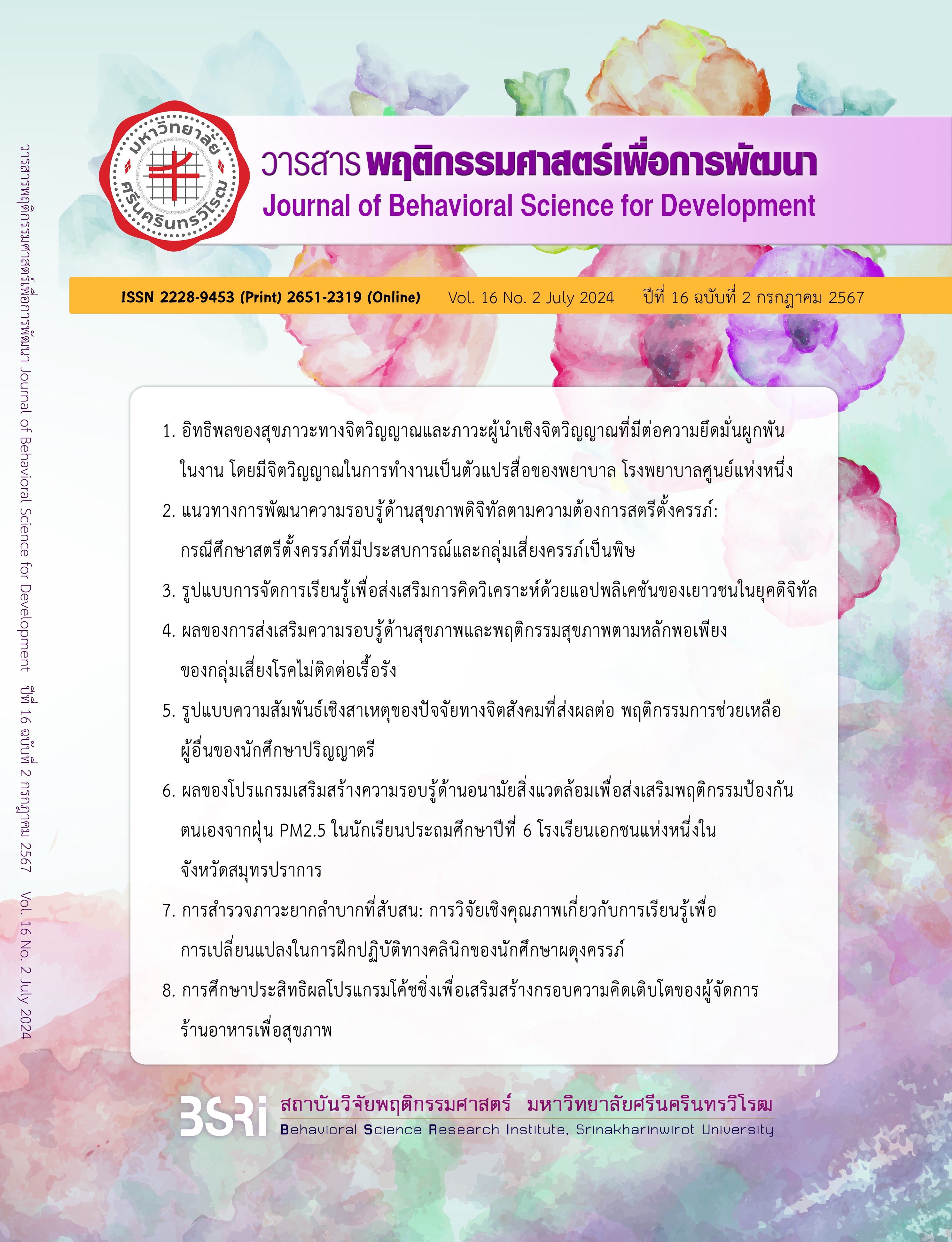Learning Management Model to Promote Analytical Thinking by Applications for Youth in the Digital Era
Keywords:
Analytical Thinking, learning management model, application, youths, digitalAbstract
The learning management model it is another form of learning. that uses the application as a tool to promote analytical thinking for youth in the digital age with a flexible and easy to access anywhere anytime, aimed at promoting analytical thinking among youths in the digital age through applications seeks to develop analytical thinking by integrating concepts from various disciplines, including constructivism theory, self-regulation, social support, and connectivism theory. This framework aims to guide learners through the following steps: 1) problem identification or topics of interest, 2) knowledge exploration, 3) analysis process, 4) application of knowledge or real-life practices, 5) conclusion and effective knowledge presentation, and 6) reflection process within learners or self-assessment. Through the integration of various important theoretical concepts, an effective learning management model has been created to promote analytical thinking skills among youths in the digital age.
References
Angkhasyalak, Y. (2016). Effects of organizing Thai language learning activities using a 5-step process on students' analytical thinking ability and active learning attitude (Master's thesis). Chulalongkorn University, Thailand.
Bandura, A. (1986). Social foundations of thought and action: A social cognitive theory. Prentice Hall.
Boekaerts, M. (1997). Self-regulated learning: A new concept embraced by researchers, policy makers, educators, teachers, and students. Learning and Instruction, 7(2), 161-186.
Buadaeng, R. (2014). Research to develop a knowledge creation kit based on constructivist theory based on the philosophy of Sufficiency Economy that affects responsibility. Problem-solving ability and academic achievement social studies learning group Religion and culture of 6th grade students. Graduate Studies Journal, 12(59), 41-50. [in Thai]
Caplan, G. (1974). Support systems. Support systems and community mental health: Lectures on concept development.
Charoenket, K. (2024). A Systematic Review and Meta-Analysis on Learning Management Model to Enhance Analytical Thinking Secondary Students. Journal of Inclusive and Innovation Education, 8(1), 91-105. [in Thai]
Hanphithak, K. (2016). Results of organizing learning activities according to constructivist theory on the concepts and ability to solve mathematical problems about triangles of 5th grade students (Master's thesis). Burapha University, Thailand.
House, J. S. (1985). Barriers to work stress: I. Social support. In Behavioral medicine: Work, stress and health (pp. 157-180). Springer.
Juthapakdeekul, N. (2016). Training documents on Using the assessment of executive thinking development in early childhood.
Khamdaeng, P. (2018). Action research to develop creative skills with an inquiry-based learning model driven by argumentation strategies. Environmental issues for Mathayom 4 students (Master's thesis). Naresuan University, Thailand.
Laohajaratsaeng, T. (2013). Lecture documents on learning for teachers in the digital age. Paper presented at the lecture notes on learning for teachers in the digital age.
Laoriandee, W. (2017). Active learning strategies to develop thinking and raise the quality of education for the 21st century (Vol. 12). Nakhonpathom: Petchkasem Printing Group.
Office of the Education Council. (2020). Proactive competency-based learning management. 21 Century Company Limited.
O'Halloran, K. L. (2017). Multimodel analysis for critical thinking. Learning Media and Technology, 42(2), 147-170.
Phetthongkam, S. (2013). Effects of constructivist teaching and cooperative learning on the analytical thinking ability and scientific concepts of secondary school students (Master's thesis). Chulalongkorn University, Thailand.
Phuengprayoon, W. (2019). Development of a science learning model by integrating constructivist theory with questioning techniques to develop scientific thinking and the scientific mind of students in grade 6. Journal of Education, 7(2), 479-494
Piaget, J. (1964). Part I: Cognitive development in children: Piaget development and learning. Journal of research in science teaching, 2(3), 176-186.
PISA Thailand, IPST. (2023). PISA 2021 assessment results for reading, mathematics and science. Bangkok Institute for the Promotion of Teaching Science and Technology (IPST).
Pollit, P. (1984). Department of Behavioral Sciences, University of California. California.
Pumpuang, K. (2015). Organizing learning activities. with knowledge connection theory (Connectivism) through social media. Journal of Liberal Arts Review, 10(19). 1-13. [in Thai]
Sangphum, W. (2011). Teaching and learning management model according to connectivism theory. Journal of Vocational and Technical Education, 1(2), 50-56. [in Thai]
Siemens. (2005). Connectivism: A learning theory for the digital age. http://www.idtl. org/Journal/Jam _05/article01.htm
Techawatakul, L. (2012). Factors affecting work adjustment of personnel in Catholic schools. Under the Diocese of Bangkok Educational Area 1 (Master's Thesis). Silpakorn University, Thailand.
Wanphen, S. (2022). Developing analytical thinking ability. of students in Grade 6 by organizing learning according to the concept of constructivist theory together with the technique of using graphic organizers (Master's Thesis). Silpakorn University, Thailand.
Wongyai, N. (2017). Guidelines for developing digital literacy skills of digital natives. Journal of Humanities, Social Sciences and Arts, 10(2). [in Thai]
World Economic Forum. (2020). Shaping the Future of the New Economy and Society. https://www.weforum.org/platforms/shaping-the-future-of-the-neweconomy-and-society.
Yaemwong, P. (2012). A study of social support that affects life satisfaction of Thammasat University students (Master's Thesis). Srinakharinwirot University, Thailand.
Zimmerman, B. J., & Martinez-Pons, M. (1988). Construct validation of a strategy model of student self-regulated learning. Journal of educational psychology, 80(3), 284.
Downloads
Published
How to Cite
Issue
Section
License
Copyright (c) 2024 Journal of Behavioral Science for Development

This work is licensed under a Creative Commons Attribution-NonCommercial-NoDerivatives 4.0 International License.



